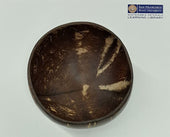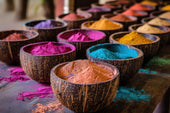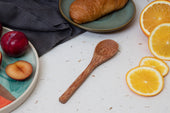As environmental concerns around plastic pollution and non-biodegradable materials rise, people are increasingly turning to eco-friendly alternatives. One such trend gaining traction is the use of coconut bowls; a unique, sustainable option for those seeking to reduce their environmental footprint. While we at Nariyal did not jump into this bandwagon catching the hype but while we did find it attractive and appealing, we wanted to make our efforts have a wider impact and actually put purpose behind our products. While these bowls are visually appealing and environmentally friendly, many people have questions about their safety and practicality in daily use. Are coconut bowls safe to eat from? Let’s dive into the details to address this and other important questions.
The Creation of Coconut Shell Bowls: From Waste to Wonder
Coconut bowls are made from discarded coconut shells, which would otherwise be thrown away or burned. This process of upcycling waste materials has numerous environmental benefits. At Nariyal, we transform these shells into beautiful, handcrafted bowls by cleaning, sanding, and polishing them, ensuring that no chemicals or synthetic substances are used during the production process.

This ensures that coconut bowls are not only natural but also free from harmful chemicals such as BPA, plastics, and synthetic dyes, making them entirely safe to eat from. Each bowl is unique, representing both the beauty and variety of nature.
Our range of coconut bowls are designed with sustainability in mind, and by choosing coconut bowls, you're not only contributing to the reduction of environmental waste but also adopting a more sustainable lifestyle.
Are Coconut Bowls Safe for Eating Hot and Cold Foods?
Coconut shell bowls are relatively versatile and safe to use for a wide variety of foods. Whether you're enjoying a delicious smoothie bowl, a salad, or a hearty rice dish, these bowls can handle it as long as the temperature is right. However, when it comes to extremely hot foods, such as boiling soups or stews, coconut bowls may not be the best option as they’re ultimately naturally derived products made from discarded coconut shells, they do not have the same heat resistance as glass or ceramic bowls.
Coconut bowls are durable but can warp or crack if exposed to high temperatures for long periods. For instance, serving piping hot soups directly into the bowl may cause the bowl to lose its shape or crack almost immediately. A good rule of thumb is to let hot dishes cool down a little before placing them in your coconut bowl. This ensures the longevity of the bowl while still allowing you to enjoy your meal in a sustainable way.
Are Coconut Bowls Dishwasher Safe?
One question we frequently receive is whether coconut bowls are dishwasher safe. The simple answer is No, coconut bowls are not dishwasher safe. Although they are durable and are made from natural materials, coconut shell bowls are not built to withstand the harsh and turbulent environment inside a dishwasher. The high heat and strong water pressure can cause the bowls to crack, lose their finish, or even warp over time.
To extend the life of your coconut bowls, we recommend hand-washing them. Here’s how to do it:
- Wash your coconut bowl with some soap and water at room temperature.
- Use a soft sponge, natural scrubber or cloth to gently clean the surface.
- Rinse it thoroughly and dry it immediately with a towel.
Avoid soaking the bowl in water for long periods, as this can weaken the natural fibers in the coconut shell. By following these care instructions, your coconut bowls will remain durable and beautiful for a long period of time.
Are Coconut Bowls Microwave Safe?
Another important question is whether coconut bowls are microwave safe. The answer is No, coconut bowls are not microwave safe. The coconut shell is not designed to handle the intense heat generated by microwaves, which can lead to cracks or warping. Additionally, uneven heating can cause burns or damage to the bowl itself. Furthermore, we do not recommend placing coconut bowls in the microwave as this can lead to the bowl catching fire or breaking with a loud noise, thereby causing health hazards.
If you want to heat food before serving it in your coconut bowl, we recommend using a microwave-safe dish first and then transferring the food into your coconut bowl. This way, you can enjoy both the practicality of heating your food and the aesthetic appeal of serving it in a sustainable, eco-friendly bowl.
The Benefits of Using Coconut Bowls
Coconut bowls offer a wide range of benefits, from their eco-friendly nature to their unique, handcrafted beauty. Let’s break down some of the key advantages of using coconut bowls in your daily life:

1. Eco-Friendly and Sustainable
Coconut bowls are made from discarded coconut shells, which would otherwise go to waste. By choosing coconut bowls, you are supporting the reduction of waste and promoting sustainability. At Nariyal, we pride ourselves on creating products that contribute to a circular economy by using resources in a way that minimizes waste. You can read more about our story here.
In addition to their positive environmental impact, coconut bowls are completely biodegradable, which means they won’t end up in a landfill like many synthetic products. Once they’ve reached the end of their lifecycle, they can decompose naturally.
2. Free from Harmful Chemicals
Many plastic bowls and kitchenware items contain harmful chemicals such as BPA, phthalates, and other toxins that can chemically contaminate your food. Our coconut bowls are 100% natural and free from any synthetic materials, ensuring that your food remains pure and safe. We do not paint or coat our bowls with any chemicals, not even food safe paint.
By choosing coconut bowls, you’re making a conscious decision to avoid these harmful chemicals, protecting both your health and the environment.
3. Durable and Long-Lasting
With proper care, coconut bowls are incredibly durable and long-lasting. Though they require a little more attention than traditional bowls such as hand washing and avoiding the microwave; taking these extra steps will ensure that your bowls last for a long time..
4. Handcrafted Uniqueness
One of the most appealing aspects of coconut bowls is that no two bowls are exactly alike. Each bowl is handcrafted from a unique coconut shell, meaning that each one has its own color variations, texture, and shape. This makes them a beautiful and personalized addition to your kitchen or dining table. You can explore our coconut bowl collection to find a bowl that suits your style.
Are Coconut Bowls Practical for Everyday Use?
Coconut bowls are not just for special occasions or aesthetic Instagram posts, they are practical for everyday use! Whether you're serving a vibrant smoothie bowl, a Buddha bowl, or even a simple salad, coconut bowls are a great option. Their lightweight design makes them easy to handle, and their size is ideal for portion control, which can help reduce food waste.
Furthermore, coconut bowls are excellent for meal prep. Since they are natural and free of harmful chemicals, you can store your fresh ingredients in them without worrying about chemical contamination. For long-term storage, we recommend using airtight containers, but for short-term meal prep or serving, coconut bowls are a fantastic, eco-friendly choice.
Coconut Bowls: A Global Sustainability Movement
The rise of coconut bowls is part of a larger global sustainability movement that focuses on reducing waste, promoting natural products, and minimizing our environmental impact. More and more people are looking for ways to live sustainably, and adopting eco-friendly kitchenware is one small step in that direction.

According to the Plastic Pollution Coalition, more than 8 million tons of plastic waste enters our oceans every year. Choosing sustainable, biodegradable products like coconut bowls can significantly reduce this number. By opting for natural materials, we contribute to a cleaner planet and help reduce our reliance on harmful plastic products.
Why Coconut Bowls Are Perfect for Vegan and Plant-Based Lifestyles
If you follow a vegan or plant-based lifestyle, coconut bowls are a perfect fit for your kitchen. Their natural, plant-based origins align seamlessly with vegan values of sustainability and environmental protection. Many vegans are also drawn to the handcrafted nature of coconut bowls, which adds a sense of mindfulness to mealtime.
Coconut bowls are a healthy option for serving plant-based dishes like smoothie bowls, acai bowls, buddha bowls, fruit salads, grain bowls, and more. You can even get creative with recipes, showcasing the natural beauty of your coconut bowl in your food presentation. We regularly share recipe ideas and inspiration on our blog and social media, where you can find plenty of plant-based options to try.
Coconut Bowls in the Zero Waste Kitchen
A zero-waste kitchen is all about reducing waste and reusing resources as much as possible, and coconut bowls fit perfectly into this philosophy. By using products that are biodegradable, upcycled, and free from harmful chemicals, you’re taking a step toward a more sustainable kitchen.
Other zero-waste practices that align well with using coconut bowls include:
- Using Reusable Bags and Containers: Instead of plastic bags and containers, use cloth bags and glass jars for food storage and shopping.
- Composting Food Scraps: After cooking, compost your food scraps instead of throwing them away. Coconut bowls, once they’ve reached the end of their lifespan, can also be composted.
- Reducing Single-Use Plastics: Coconut bowls help reduce the need for single-use plastic bowls or containers, making your kitchen more environmentally friendly.
For more zero-waste living tips, visit Zero Waste Chef, a leading resource for sustainable kitchen practices.
How to Care for Your Coconut Bowls
Taking care of your coconut bowls properly will extend their lifespan and keep them looking beautiful. Here are some key care tips to follow:
- Hand Wash Only: Always hand wash your coconut bowls with warm water and a mild soap. Avoid rough and sharp materials, as they can leave scratches and scuffs on the surface of the bowl.
- Dry Immediately: After washing, please dry the bowls with a soft cloth or towel to prevent water from soaking into the natural fibers.
- Avoid Extreme Temperatures: As mentioned earlier, coconut bowls should not be used in the microwave, oven, or dishwasher. Also, avoid putting extremely hot foods in the bowls to prevent warping or cracking.
- Polish Regularly: You can use a bit of coconut oil to polish your bowls occasionally. This helps maintain their shine and strengthens the natural fibers of the coconut shell. Check out our maintenance guide for more detailed instructions.
Why Coconut Bowls Are a Worthy Investment
Coconut bowls are more than just a trend, they are part of a larger movement toward sustainability and conscious consumerism. By choosing coconut bowls, you’re making a positive impact on the environment while also bringing a touch of nature into your daily routine. They’re safe to eat from, free from harmful chemicals, and beautifully handcrafted, making them a perfect choice for eco-conscious consumers.

At Nariyal, we are committed to providing high-quality, sustainable products that contribute to a greener world. Explore our full range of eco-friendly products on our website and join us in making small but impactful changes toward a more sustainable future.








